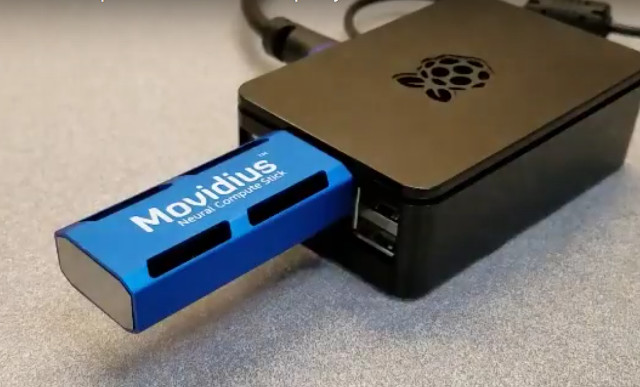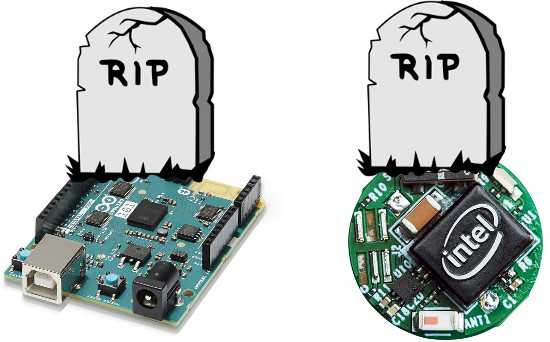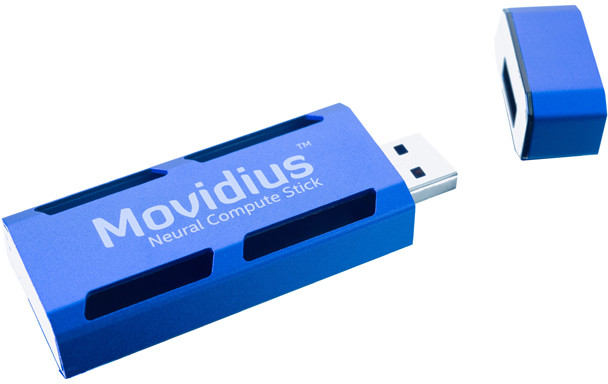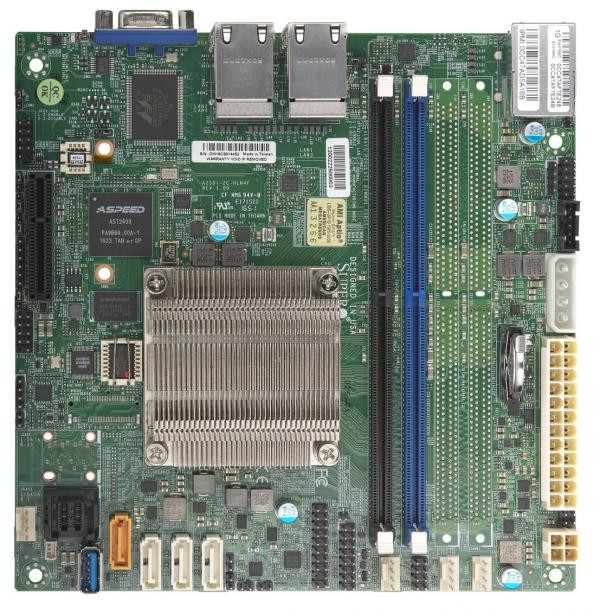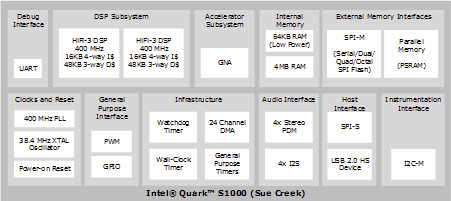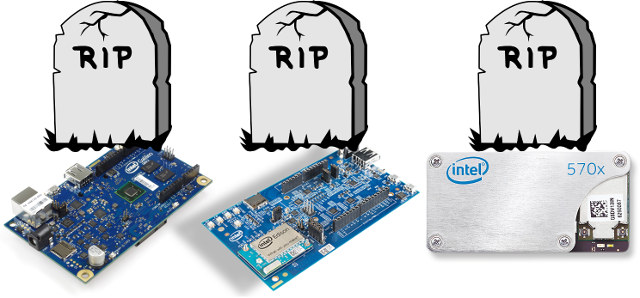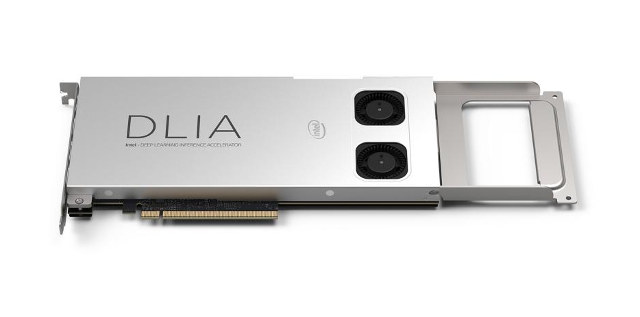Intel recently launched Movidius Neural Compute Stick (MvNCS)for low power USB based deep learning applications such as object recognition, and after some initial confusions, we could confirm the Neural stick could also be used on ARM based platforms such as the Raspberry Pi 3. Kochi Nakamura, who wrote the code for GPU accelerated object recognition on the Raspberry Pi 3 board, got hold of one sample in order to compare the performance between GPU and MvNCS acceleration. His first attempt was quite confusing as with GoogLeNet, Raspberry Pi 3 + MvNCS achieved an average inference time of about 560ms, against 320 ms while using VideoCore IV GPU in RPi3 board. But then it was discovered that the “stream_infer.py” demo would only use one core out of the 12 VLIW 128-bit vector SHAVE processors in Intel’s Movidius Myriad 2 VPU, and after enabling all those 12 cores instead of just one, […]
Intel’s Movidius Neural Compute Stick Supports Raspberry Pi 3 Board
Last month, Intel introduced Movidius Neural Computer Stick to accelerate applications such as object recognition, and do so offline, i.e. without the cloud, and at low power. While there was not that much information available at the time, the minimal requirements for the host machine were that it had to be a x86_64 computer running Ubuntu 16.04, and come with at least 1GB RAM, and 4GB storage. So I understood the stick would only work attached with 64-bit Intel or AMD processors, and ARM development boards would not be an option. But today, I’ve found that Movidius had uploaded a new video showing a Python based object recognition demo with the Neural Compute Stick connected to the the Raspberry Pi 3 board. You just need to add a USB camera, copy ncapi directory from the SDK installed on your Ubuntu 16.04 development machine to the Debian Jessie installed on RPi 3 […]
Intel Curie Module, Arduino 101 Board Are Being Discontinued (Too)
Intel seems to have completely given up on its efforts to bring products specific to the Internet of Things. After discontinuing Intel Edison, Galileo and Joule boards & modules last month, forcing companies to look for alternatives, the company has now issued product discontinuance / end-of-life notices for Intel Curie Module and Arduino 101 board, itself based on the Curie module. The two product change notification notice can be found below for: Select Intel Curie Module Products – PDF Select Intel Arduino 101 Products – PDF The use of the word “Select” would normally mean some versions of the module and board won’t be affected, but I fail to see which ones here, as AFAIK there’s only one Arduino 101 board, and two variants of Curie modules, all three to be discontinued. Arduino 101 will be phased out faster with the following milestones: July 17, 2017 – Product Discontinuance Program […]
Intel’s Movidius Neural Compute Stick Brings Low Power Deep Learning & Artificial Intelligence Offline
Intel has released several Compute Stick over the years which can be used as tiny Windows or Linux computer connected to the HDMI port of your TV or monitor, but Movidius Neural Computer Stick is a complete different beast, as it’s a deep learning inference kit and self-contained artificial intelligence (A.I.) accelerator that connects to the USB port of computers or laptops. Intel did not provide the full hardware specifications for the kit, but we do know the following specifications: Vision Processing Unit – Intel Movidius Myriad 2 VPU with 12 VLIW 128-bit vector SHAVE processors @ 600 MHz optimized for machine vision, Configurable hardware accelerators for image and vision processing; 28nm HPC process node; up to 100 gigaflops USB 3.0 type A port Power Consumption – Low power, the SoC has a 1W power profile Dimensions – 72.5mm x 27mm x 14mm You can enter a trained Caffe, feed-forward […]
Supermicro A2SDi-2C-HLN4F Server Mini-ITX Motherboard is Based on Intel Atom C3338 “Denverton” Processor
Almost exactly one year ago, I wrote about Intel Atom C3000 Series “Denverton” processor based on the same Goldmont architecture used in Apollo Lake processor, and used in an early GIGABYTE MA10-ST0 server motherboard prototype. The latter is not out yet, but according to a YouTube video, the 16-core motherboard should be launched in H2 2017. In the meantime, Supermicro also made their own Denverton motherboard based on a lower-end Atom C3338 dual core processor. Supermicro A2SDi-2C-HLN4F board specifications: Processor – Intel Atom C3338 dual core Denverton processor @ 1.50 / 2.20 GHz with 4 MB cache; 9W TDP System Memory Up to 64GB Register DIMM RDIMM and DDR4-1866MHz Up to 32GB Unbuffered ECC/non-ECC UDIMM, DDR4-1866MHz, in 2 DIMM slots Storage – 4x SATA 3 ports, but up to 8x SATA 3 (6 Gbps) ports are configurable; N.B.: total combined PCI-E lanes and SATA ports is up to 8 Connectivity […]
Intel Quark S1000 “Sue Creek” Processor to Support On-Chip Speech Recognition
Intel may have announced plans to discontinue several of their IoT boards, but based on some documents I received, the company has not given up on the Quark family, although they may have given up on the Intel architecture for low power microprocessor, as Intel Quark S1000 – codenamed “Sue Creek” – will feature two Tensilica LX6 cores (yes, just like ESP32), and is designed to handle speech recognition at the edge (e.g. locally), so some of your voice commands should still work when Internet is down. Intel Quark S1000 key features and specifications: Digital Signal Processors Dual Tensilica LX6 cores @ 400 MHz with HiFi3 DSP Single precision scalar floating-point instructions 16KB 4-way I$; 48KB 4-way D$ Up to 2400 DMIPS, 3.2 GMACS (16×16), 800 MFLOPS of Compute Speech Accelerators A GMM (Gaussian Mixture Model) and neural network accelerator Low power keyboard and limited vocabulary recognition Up to 9.6 […]
Intel Issues End-of-Life Notices for Galileo / Galileo 2, Edison and Joule Boards & Modules
While I’m not sure many of my readers are using them, Intel introduced several IoT development kits and modules over the years, with products like Intel Galileo, followed by Galileo 2, Edison module development board all based on Quark processors, and more recently Intel Joule modules powered by Intel Atom T550x / T570x processors. The three boards / modules and corresponding modules will soon be no more, as Intel issues three end-of-life (EOL) notices for: Intel Galileo Board, and Intel Galileo Gen2 Board Products – PDF Select Intel Edison Compute Module, Intel Edison Breakout Board, Intel Edison Kit for Arduino, and Intel Edison Breakout Board Kit Products – PDF Intel Joule 570x Compute Module, Intel Joule 550x Compute Module, Intel Joule 570x Developer Kit and, Intel Joule 550x Developer Kit Products – PDF All three follow the same “forecasted key milestones”: June 16, 2017 – Product Discontinuance Program Support Begins […]
Intel DLIA is a PCIe Card Powered by Aria 10 FPGA for Deep Learning Applications
Intel has just launched their DLIA (Deep Learning Inference Accelerator) PCIe card powered by Intel Aria 10 FPGA, aiming at accelerating CNN (convolutional neural network) workloads such as image recognition and more, and lowering power consumption. Some of Intel DLIA hardware specifications: FPGA – Intel (previously Altera) Aria 10 FPGA @ 275 MHz delivering up to 1.5 TFLOPS System Memory – 2 banks 4G 64-bit DDR4 PCIe – Gen3 x16 host interface; x8 electrical; x16 power & mechanical Form Factor – Full-length, full-height, single wide PCIe card Operating Temperature – 0 to 85 °C TDP – 50-75Watts hence the two cooling fans The card is supported in CentOS 7.2, and relies on Intel Caffe framework, Math Kernel library for Deep Neural Networks (MKL-DNN), and works with various network topologies (AlexNet, GoogleNet, CaffeNet, LeNet, VGG-16, SqueezeNet…). The FPGA is pre-programmed with Intel Deep Learning Accelerator IP (DLA IP). Intel DLIA can […]


